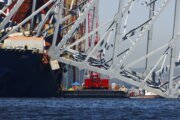VIVIAN SALAMA
Associated Press
KIRKUK, Iraq (AP) — When Sunni militants captured Mosul, Iraq’s second largest city, in June, Abu Sara and his family feared their town of Taza, located some 50 kilometers southeast of the city, would inevitably be next. Government soldiers had dropped their weapons and abandoned their posts — forcing residents to fend for themselves.
It wasn’t before long before the gas was cut, then the water, ahead of the imminent onslaught. The family was left with little choice but to flee to the closest city that could offer them safe haven — Kurdish-dominated Kirkuk.
But life has been filled with hardship for Abu Sara and the tens of thousands of Iraqi Arabs who escaped one opponent only to face another. Displaced Arabs who fled to oil-rich Kirkuk say tensions with the local Kurdish population have surged amid fears that Arabs are linked to the Islamic State militant group that has seized a third of the country. Local and displaced Arabs complain of discrimination and attack from Kurdish fighters known as peshmerga, accusing them of trying to assert a Kurdish majority through intimidation.
“When we walk in the streets we are looked at with suspicion,” Abu Sara said from his temporary residence at the home of Sheik Abdulrahman Menshed al-Assi, the head of the Sunni Obeid tribe in Kirkuk. “They assume we are all Daesh,” he added, using the Arabic acronym for the Islamic State group, “and so they treat us like terrorists.”
Kurdish forces claimed control of long-disputed city just days after the Islamic State group advanced across northern Iraq, seizing major cities including Mosul and Tikrit. Kirkuk, located along the fluid line that separates Kurdish northern Iraq from the rest of the country, is home to Arabs, Kurds and Turkmen, and all have competing claims to the oil-rich area. The Kurds have long wanted to incorporate the city into their semi-autonomous region, but Arabs and Turkmen are opposed.
In the courtyard alongside Abdullah Khalel Ibrahim’s family home in southern Kirkuk, the sound of a car bomb a few blocks away prompts a brief, disinterested pause in his conversation with displaced relatives staying with him. A lifelong resident of Kirkuk, Ibrahim said discrimination against Arabs is not new, but is on the rise.
“Kidnappings, killings, difficulties finding jobs, difficulties moving around freely,” he began, “all of that has doubled now. I lived in Kirkuk all my life and I feel unwelcome here.”
Oum Hakem, his relative from Tikrit, said peshmerga soldiers almost denied her family entrance into the city when they were fleeing violence at home. “I have three college-age sons,” Oum Hakem said, preferring to provide only her nickname. “They did not want to let them in, but it was very important for them to settle someplace to take their (annual) exams.”
At government buildings across the city, pictures of Jalal Talibani, Iraq’s former president, decorate private offices, conference halls and corridors, underlying the overwhelming loyalty of many in Kirkuk to his People’s Union of Kurdistan.
Calls for Kurdish independence however have intensified since the militants began their lightening advance across northern Iraq. But to do so, the region would need a clear Kurdish majority, a status currently being undermined by a wave of refugees. At least 60,000 Arab and Turkmen displaced by the fighting have flooded into Kirkuk since June, according to Rakkan Ismail Ali, the province’s deputy governor, and more than a million have fled to northern Iraq this year. The influx is prompting major security concerns.
“The city is not ready,” said Ali, himself an Arab. “We don’t know how the security forces are dealing with the situation. With the current mess, (we can’t tell) if those who are coming to Kirkuk are Daesh or not,” he said.
The Islamic State militants have looked to capture a number of oil fields, power plants, dams and factories in Iraq and Syria and have made an effort to push toward Kirkuk itself, which is home to over 10 billion remaining barrels of proven oil reserves, making it an appealing prize.
U.S. airstrikes began on Aug. 8 to support Iraqi and Kurdish ground forces taking on the Islamic State, and a number of countries have moved to support the Kurds with newer, more sophisticated weapons to boost their capabilities on the battle field. U.S. Central Command has reported a number of airstrikes near Kirkuk, including an attack on an Islamic State convoy this week.
Peshmerga soldiers who spoke to The Associated Press acknowledged that practices of exclusion take place at many of the checkpoints across the city, but insisted that it is strictly a security precaution.
“Peshmerga are now surrounding the borders of Kirkuk,” and we have to pick out civilians from militants every day, said peshmerga Lt. Gen. Asso Ali, adding that sometimes that requires screening certain people in times of uncertainty. “It’s our responsibility to keep the city safe.”
Copyright 2014 The Associated Press. All rights reserved. This material may not be published, broadcast, rewritten or redistributed.







